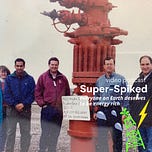This week’s videopod was originally recorded on Twitter Spaces on August 7, 2022, where I joined #COM to discuss my outlook for Canadian energy. It is an audio only recording, but I have included the YouTube link in case you prefer it to the Substack player.
Speakers (in order of appearance):
Sohaib Abbas@sohaibab9
Arjun⚡️Murti @ArjunNMurti
Mark Skittle🇨🇦@BJamz2022
Alberta, PhD (Poor/Poorer)@Albertagarbage
David Heikkinen@heik_energy
William Lacey@William39009143
0:00: Welcome and introduction by @sohaibab9
2:15: Introductory comments by @ArjunNMurti focused on why I started Super-Spiked.
7:35: Question from @sohaibab9: What is the Role of Canadian energy production in the world stage?
21:00: Question from @sohaibab9: Why is there a misperception that Canadian production is high cost and unprofitable especially versus American barrels and other areas?
28:00: Comment from @BJamz2022, a subsurface SAGD engineer, on how he has looked at full-cycle versus half-cycle economics.
30:40: Question @Bjamz2022: Question on how can ESG considerations can play into securing expanded pipeline export capacity for Canadian oils?
45:45: Question from @Albertagarbage, live from an operating SAGD pad: What is outlook for cost of capital for Canadian oils vis-a-vis US oils and potential to develop oil sands resources vs US shale oil?
53:40: Question from @sohaibab9: What made you make the original Super-Spike call in 2005? What are the similarities and differences with the outlook today?
1:08:10: Question from @heik_energy: What do you think it takes to get the broader market to favor Energy over Tech?
1:13:50: Comment from @heik_energy on 1970s performance on Energy and then an update on what he is up to now.
1:18:15: Question from @William39009143 (read by Sohaib): What does Arjun think about cost of capital for industry?
1:24:15: Question from @BJamz2022: Is it even possible for CAPEX to ramp given aging of the workforce?
1:31:45: Comment from @William39009143 thanking me for participating in today’s Twitter Spaces.
1:35:25: Question from @sohaibab9: When will Canadian energy companies start to draw more attention from American investors?
1:41:15: Closing remarks from @sohaibab9, @BJamz2022, and @ArjunNMurti
🔔 3 Ways to Subscribe
All Content: If you subscribe to Super-Spiked via email, you will receive all content to your inbox and it is also all on the Super-Spiked website. I have been aiming to publish about once a week, usually on Saturday, with an occasional intra-week additional video update.
YouTube channel for video only: You can subscribe directly to the video feed of
Super-Spiked Videopods on my YouTube channel Super-Spiked by Arjun Murti.
Apple Podcasts, Spotify for audio only. You can subscribe directly to the audio only feed on Apple Podcasts, Spotify or your favorite podcast player app. The podcast is simply the audio for the YouTube videos.
⚖️Disclaimer
I certify that these are my personal, strongly held views at the time of this post. My views are my own and not attributable to any affiliation, past or present. This is not an investment newsletter and there is no financial advice explicitly or implicitly provided here. My views can and will change in the future as warranted by updated analyses and developments. Some of my comments are made in jest for entertainment purposes; I sincerely mean no offense to anyone that takes issue.
📜 Credits
This episode of Super-Spiked Videopods was originally recorded on August 7, 2022 on Twitter Spaces. This version was lightly edited and produced by Super-Spiked Productions.













Share this post